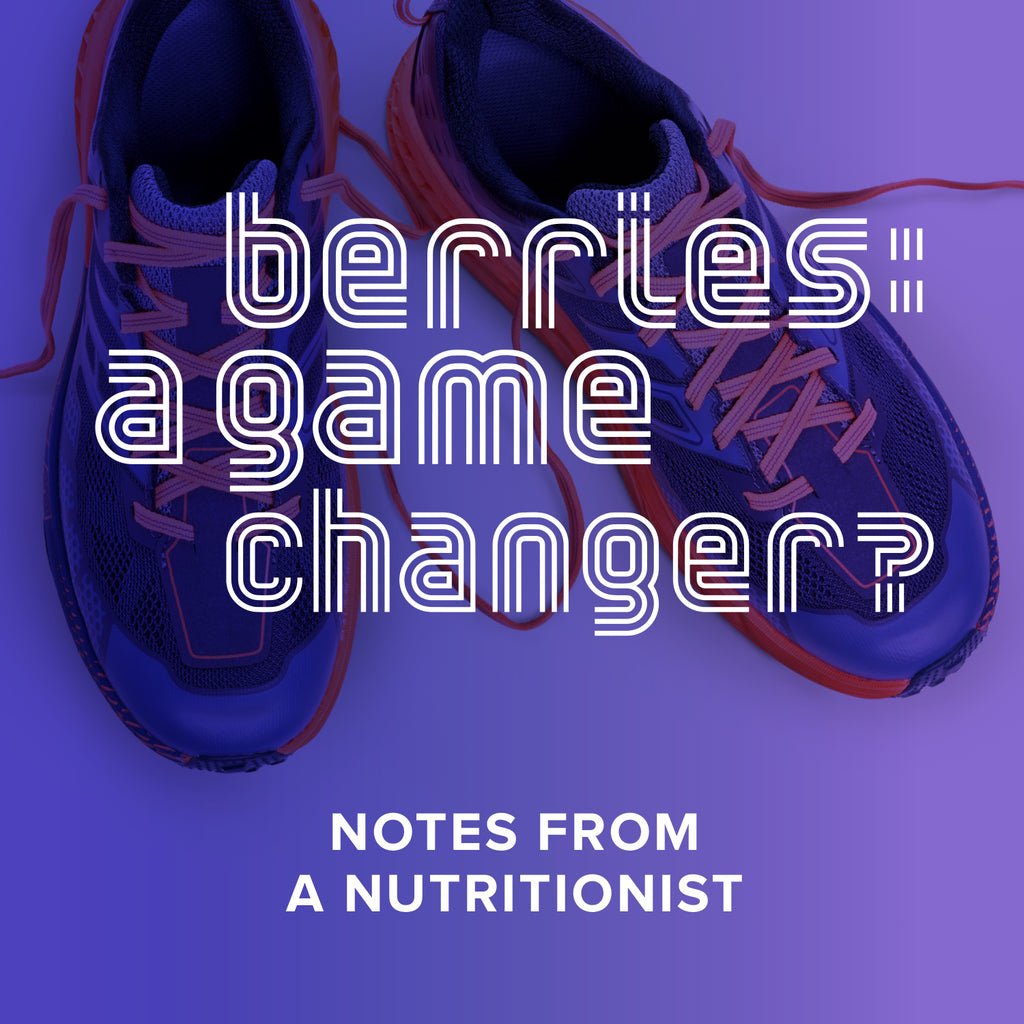by Rachel Kimble BSc (Hons), MSc, SENr.
Back on track
With gyms and pools all now re-opened, we have been able to get our health and fitness routines going again. But whether you are just starting back up, or are at the top of your game, it’s probably about time to get in the know about how berries, or more specifically the nutrients they contain, can support your general health and also help with your performance or post-workout recovery.
Can berries really help?
Fruit and vegetables in general have the potential to benefit performance and recovery, because of the essential nutrients they contain; including numerous vitamins, minerals and other compounds that can keep the body in tip-top condition. Specific compounds, anthocyanins, found in many fruits and vegetables have gained a lot of attention in sport and exercise research. Anthocyanins are the pigments that give plants their red, blue and purple colouring - so you guessed it, many berries are packed full of them.
So what’s the deal with anthocyanins?
In sporting events where the smallest difference can mean first or second place, any marginal advantage could give you your competitive edge and that’s why berries and other anthocyanin-rich foods are being researched. So what is the science behind them?
Performance
Anthocyanins can act as antioxidants and many have anti-inflammatory properties. They have been shown to improve muscle function and reduce fatigue, factors that can help with performing your best during exercise. Interestingly some studies suggest they can improve fat oxidation and blood circulation during exercise – which means they have the potential to positively impact longer distance endurance performance [1]. Although we don’t know the exact timing, anthocyanins are most abundant in your bloodstream soon after consuming them, so taking them approximately 1-2 hours before exercise is probably the best plan to boost your performance [2].
Recovery
Exercise, particularly of a strenuous nature, can result in muscle damage and soreness. While some amount of damage may be inevitable and necessary to adapt and improve, being able to recover quicker and get back to it may also be beneficial. A number of studies have shown foods such as berries and cherries might be able to lessen muscle damage, reduce levels of soreness, and ultimately enhance recovery potentially via their antioxidant and anti-inflammatory effects (which have been proposed to be attributable to their high anthocyanin content) [3-6].
I’m not an Olympian!
Good news: you don’t have to be going for gold to benefit from the power of berries.
Amongst other health benefits, a higher intake of anthocyanin-rich foods is thought to be helpful for many aspects of health that include weight maintenance [7], lowering cholesterol levels and blood pressure [8]. There aren’t many studies yet, but in those where exercise and these foods are combined, anthocyanins might complement the health benefits, when compared to exercise alone. For example, exercising individuals given 150 g of blueberries for 4 weeks had less “bad” (LDL) and more “good” (HDL) cholesterol than those who just did exercise [9]. In another study, individuals were fed a high-fat meal in the morning with or without 60 ml of tart cherry juice. It was found that they had lower triglycerides if they had exercised the day before with the juice compared to exercising without the juice [10]. These data are exciting because we already know exercise and a healthy diet go hand-in-hand for better health, but it would appear that anthocyanins may boost the health benefits of exercise, as well as performance.
Conclusion
Whether you are a gym bunny, athlete or even none of the above, berries can still help keep you healthy and also could be beneficial for your performance and recovery.
See the latest research: https://www.haskapa.com/pages/haskapa-and-sports-research
- Cook, M.D. and M.E.T. Willems, Dietary anthocyanins: A review of the exercise performance effects and related physiological responses. International journal of sport nutrition and exercise metabolism, 2019. 29(3): p. 322-330.
- Bowtell, J. and V. Kelly, Fruit-derived polyphenol supplementation for athlete recovery and performance. Sports Medicine, 2019. 49(1): p. 3-23.
- McLeay, Y., et al., Effect of New Zealand blueberry consumption on recovery from eccentric exercise-induced muscle damage. Journal of the International Society of Sports Nutrition, 2012. 9(1): p. 19.
- Howatson G, Snaith GC, Kimble R, Cowper G, Keane KM. Improved Endurance Running Performance Following Haskap Berry (Lonicera caerulea L.) Ingestion. Nutrients. 2022; 14(4):780. https://doi.org/10.3390/nu14040780
- Howatson, G., et al., Influence of tart cherry juice on indices of recovery following marathon running. Scandinavian journal of medicine & science in sports, 2010. 20(6): p. 843-852.
- Hurst, R.D., et al., Daily Consumption of an Anthocyanin-Rich Extract Made From New Zealand Blackcurrants for 5 Weeks Supports Exercise Recovery Through the Management of Oxidative Stress and Inflammation: A Randomized Placebo-Controlled Pilot Study. Frontiers in Nutrition, 2020. 7.
- Kuehl, K.S., Cherry juice targets antioxidant potential and pain relief. Medicine and sport science, 2012. 59: p. 86-93.
- Bertoia, M.L., et al., Dietary flavonoid intake and weight maintenance: three prospective cohorts of 124 086 US men and women followed for up to 24 years. bmj, 2016. 352.
- Luís, Â., F. Domingues, and L. Pereira, Association between berries intake and cardiovascular diseases risk factors: a systematic review with meta-analysis and trial sequential analysis of randomized controlled trials. Food & function, 2018. 9(2): p. 740-757.
- Nyberg, S., et al., Effects of exercise with or without blueberries in the diet on cardio-metabolic risk factors: An exploratory pilot study in healthy subjects. Upsala journal of medical sciences, 2013. 118(4): p. 247-255.
- Polley, K.R., et al., Tart cherry consumption with or without prior exercise increases antioxidant capacity and decreases triglyceride levels following a high-fat meal. Applied Physiology, Nutrition, and Metabolism, 2019. 44(11): p. 1209-1218.

